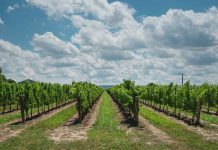Travel Alberta has announced plans to introduce a multi-year three-part strategy to help the provincial tourism industry recover from losses inflicted by Covid-19.
David Goldstein, Travel Alberta’s CEO, laid out a long-range vision for the industry at a convention in Pincher Creek on March 9.
Known as the Bootstrap Plan, the first stage, which is already underway, involves an international advertising campaign marketed primarily toward Americans, with a focus on states with high concentrations of spenders like California, Texas and New York.
Boosting air travel rates was labelled another top priority. Alberta lost 95 per cent of its airline routes to Covid, said Goldstein, and their campaign will focus on recovering international travel, starting with Calgary and Edmonton and then moving on to regional airports.
Growing tourism at the regional level is the third pillar of focus. Planning will be undertaken to develop and enhance the visitor experience, with emphasis on sustainable travel and Indigenous tourism.
Travel Alberta will provide millions of dollars worth of funding for businesses, accessible through grants, to develop products and experiences.
“We want various regions to come up with a local plan. We call them tourism master plans, and then various entrepreneurs and organizations within that plan can apply for those funds,” explained Goldstein.
The event was well attended, with representation from the Town and MD of Pincher Creek, Crowsnest Pass and Piikani First Nation, and plans were discussed to help tourism development along at the local level.
Blair Painter, mayor of Crowsnest Pass, expressed interest in gathering data to find out what areas tourists are coming from.
Cole Fawcett, chairman of the South Canadian Rockies Tourism Association and marketing manager for Castle Mountain Resort, said he’ll be keeping a close eye on rising fuel prices to see whether it will impact tourism this summer.
He noted that a key goal for SCRTA moving forward would be to draw to this region some of the crowd that would typically go only to Banff or Jasper.
Before any consultation between local partners and Travel Alberta can happen, more revenue needs to be drawn into the industry.
Darren Reeder, board advisor to the Tourism Association of Alberta, who spoke at the event, said lifting Covid travel regulations will be an important first step to supporting any long-term economic plans.
Covid policies and restrictions have worked against tourism businesses, he said, preventing them from operating effectively and making a profit.
Reeder said the industry’s total economic impact, which was $8.2 billion pre-pandemic, dropped to $5 billion, and is only just beginning to climb back up, reaching $5.5 billion in the last year.
“To get back to that pre-Covid level is going to require nothing short of the full return of international travel,” he said.
He called on the government to relax travel regulations at the United States-Canada border and to eliminate pre-arrival rapid testing for international travellers.
“We’ve been really clear in the discussions with the federal government that there’s simply no signs of data or informed reason at this point for any of those restrictions to remain,” he said.
Another component necessary for the Bootstrap Plan to be effective, he said, is finding ways to fill labour shortages caused by mass layoffs.
Prior to 2020, there were about 2.1 million workers in the tourism industry, he said, but Covid knocked this number down to 1.6 million.
Food and beverage industry employment is currently at about 30 per cent of pre-Covid levels, he said, and accommodation at about 40 per cent.
Travel Alberta plans to target some of its promotional advertising at young adults living in Ontario, Quebec and British Columbia, provinces that had a high number of workers in the Alberta tourism industry pre-pandemic. This would eventually be expanded to include residents in the United Kingdom, Australia and New Zealand.
“Our focus is about getting people back to cash-flow positivity and then to start focusing on the recovery — building of the new product, the new experiences,” said Reeder.
JOIN THE CONVERSATION
Conversations are opinions of our readers and are subject to the Code of Conduct. The Star does not endorse these opinions.










